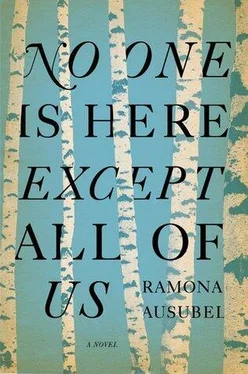I held on to an underwater branch to keep from drifting downstream, and I floated. The river did not ask my age or my purpose but kissed me blindly, the same as if I were an old man, a fish or a discarded chair. I thanked it for this.
On the bank the mud was mounded, curled around rocks, matted in the roots of the trees. The mud was full of small, hard-shelled beetles. The mud was full of the sucking roots. The trunks of the trees rose out of the river as arms for the mud, ways for the mud to catch birds. Wind flashed over the mud’s skin.
I hung the bodiless sacks of clothing over the branches and lay down, covered myself in muck, stained my skin the color of earth. I let the sky come down and the earth come up and press me between them.
“Can you tell who I am?” I asked. “What do you think, mud?”
The mud pulled at my fine hairs as it dried. The splitting felt deeper, like I might break down, pieces departing from pieces, until I was a shattered thing and the bugs could carry me away. But I was as whole as ever. The only thing I started to lose were tears, unreasonable, unspecific tears. I did not know if I was crying for the loss of something or for the weight of what I had gained. The mud did not care one way or another, it drank my sorrow up. I was a baby, then I was a teenager, and no one had ever asked me what it felt like. I could not have answered, but I would not have minded the question. Here I was, in the sloppy, thick muck, and it seemed to know how to make a place for me, to mold itself around my body. It was meeting me at all my edges. It was cold, but I did not want to move.
My hair lost its hope of being strands and instead became a mash of fibers. I sank down a little. The hands of the mud held my own hands, the arms of the mud held mine. My ears filled with the dark meat of the earth. It said, “We haven’t forgotten you.” Whispered, “You’re home.” Whispered, “We do, we do, we do remember who you are.”
Hersh found Kayla working her knife over the skin of a potato until she had a tiny, naked globe in her hand. “The new baby,” he started to say.
“Yes, I know. He’s very cute,” Kayla snapped, as surprised as Hersh was by her own jealousy.
“No,” he told her, “not that. The baby is dead.” Hersh looked away from his wife because he thought he might see a flush of relief in her cheeks.
“Dead?” she asked.
“Suffocated.” Kayla put the potato down on the counter and stabbed the knife into it for safekeeping.
“Why?” she asked, and looked at her husband with the clear eyes of a child who has come upon a piece of nonsense everyone else takes as fact. Hersh had neither a sufficient answer nor an insufficient one. Wisdom ran away from him, comfort with it. “Lena!” Kayla burst out, desperate. My ears were far from there and I did not come running. “Lena!” she yelled louder.
“Maybe she’s not here,” he said.
“Oh, oh, oh!” Kayla picked up and put down the stabbed potato. She picked up and put down the chair she had been sitting in. Hersh recognized these as the movements of someone who has lost something, but their girl was too big to be discovered in the vague condensation under a skinned vegetable, or the footprint of a chair’s skinny leg.
“What are you doing?” husband asked wife. He had not moved yet — he was waiting for the scene to make sense or come to a quiet stop.
“She’s gone!” Kayla yelled. “She’s gone!” She took from the shelf an iron soup pot and a wooden spoon, and ran outside, slamming wood against metal, shouting, “Help! Lena is missing! Lena is lost!”
When Kayla came to the banker’s door, ringing her alarm pot, the stranger opened it and begged her to be quiet.
“What are you doing?” the stranger asked.
“Lena is missing!” Kayla shrieked.
“Please,” the stranger said. “Please be quiet. The banker and his wife lost a baby today.”
“And what of my grief?” Kayla wailed. She swung the spoon once, hard, on the pot. Sense, reason, were clearly going to melt like snow on the hot surface of Kayla’s panic. “All right,” the stranger whispered. “You stay here for a minute. We’re going to find your daughter, but please. Please be quiet.”
The stranger left the others with the banker’s family, where the low ceiling pressed their grief back down each time it drifted for a moment. Igor had fallen asleep on the floor by the fire. Peace was a distant thing, but the truth of what happened had also fallen far away. His dreams were dim and chaotic. Ravens, wind, closed doors.
Kayla and Hersh were worried about whatever it was they were going to see — nothing, probably. The absence of their daughter. The places, hundreds of them, thousands, where I was not. The crooks of the trees, the trunks of the trees, the tall grass, the tall grass, the tall grass, the shelves where the chickens nested, their warm round forms atop a bed of possible kin, willing and warming them into existence, all empty of me.
“Maybe the Golem has her,” Hersh said. “What’s that story again?”
“I don’t think we’ve written it yet,” our stranger told him. “How should it go?”
“Well,” he began, “the monster is made of mud and bugs and sticks. The monster is born out of the earth itself.” He paused. “Is that a good start?”
“That’s a very good start,” our stranger assured him.
“Okay. So the monster is born out of the mud and he lives peacefully on worms and fish and small rodents.”
“I don’t think he lives peacefully at all,” said Kayla. “I think he terrorizes the villagers and chews on their toes and steals their potatoes right out from under their knives. I think he falls in love with all the daughters and takes them away to live in the mud with him.” She looked up at her husband, terror renewed. “Oh, dear! He’s stolen Lena!”
My parents sped up, shined their lights on any dark thing. The row of lanterns along the riverbank bobbed. They dipped close to the water, scanned the bushes. Webs of branches came into relief in the light, then faded back into the darkness.
I unearthed myself, sat cobbled with mud, my complete arms around my complete knees, watching someone come to me. I had traced their approach, the giveaway of their lights making a line through the fields. I knew I would be found, would be washed, would be taken to bed. I knew I would be scolded and loved.
When the chain of lights came close, when the voices with Lena in them were in my ears, I stood up. I was myself, but crusted over and thicker. Rougher. My hair was one solid brown mass, my eyebrows and my eyelashes.
“Another stranger,” the stranger whispered to herself. It was as if she were discovering herself on the shore, rescuing her own cold body from the water.
Hersh and Kayla came to the mudded person, ready to demand their daughter back. They saw my eyes and reached out together, scraped my arm and watched the brown crust fall off. Their lamps lit up their faces from below, making them look like masks, their cheekbones sunken, their chins jutting out.
The stranger recognized me, which meant she was still alone. She was still the only stranger. She turned her back to us so we would not see her face twist up.
“It’s you,” Hersh said.
“It’s me,” I answered.
“What were you doing?” Kayla wanted to know. Her voice was smoke, dissipating. The thing she was sure of — tragedy — disappeared.
“I was here. I am here.”
“Why did you leave me?” Kayla whimpered.
“I didn’t,” I said. “I just came to do the laundry and stayed on awhile.”
Kayla draped a still-wet bedsheet over me, saying, “It’s indecent. You’re not a child anymore.” They began to lead me home, but paused when the stranger did not follow. “Hey,” Kayla said, “we found her. Time to go home. Everything is fine.” The stranger, her back still turned to us, waved us away. “I’ll come back soon,” she said quietly. “I’m going to… stand here for a while.”
Читать дальше












